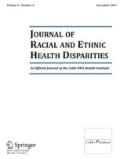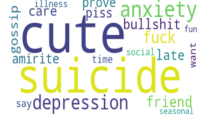Abstract
Social media sites, such as Twitter, represent a growing setting in which racism and related stress may manifest. The aims of this exploratory qualitative study were to (1) understand the essence of Twitter users’ lived experience with and response to content about race and racism on the platform, and (2) explore their perceptions of how discussions about race and racism on Twitter may impact health and well-being. We conducted six focus groups and four interviews with adult Twitter users (n = 27) from Berkeley, California, and Greenville, South Carolina. We managed the data with NVivo and conducted an interpretative phenomenological analysis to identify themes. Participants described Twitter content as displaying both overt and subtle expressions of racism, particularly for Black and Latinx people, and serving as an echo chamber where similar viewpoints are amplified. Participants described how Twitter users may feel emboldened to type offensive tweets based on the perception of anonymity, and that these tweets were sometimes met with community disapproval used to provide a collective calibration to restore the social norms of the online space. Participants perceived harmful mental, emotional, and physical health impacts of exposure to racist content on Twitter. Our participants responded to harmful race-related content through blocking users and following others in order to curate their Twitter feeds, actively engaging in addressing content, and reducing Twitter use. Twitter users reported witnessing racism on the platform and have found ways to protect their mental health and cope with discussions of race and racism in this social media environment.
Similar content being viewed by others
Data Availability
Focus group and interviews audio-recordings and transcripts are housed with the corresponding and senior authors.
References
Williams DR, Cooper LA. Reducing racial inequities in health: using what we already know to take action. Int J Environ Res Public Health. 2019;16(4):606.
Paradies Y, Ben J, Denson N, Elias A, Priest N, Pieterse A, et al. Racism as a determinant of health: a systematic review and meta-analysis. PLoS One. 2015;10(9):e0138511.
Phelan JC, Link BG. Is racism a fundamental cause of inequalities in health? Annu Rev Sociol. 2015;41:311–30.
Williams DR. Race and health: basic questions, emerging directions. Ann Epidemiol. 1997;7(5):322–33.
Bailey ZD, Krieger N, Agénor M, Graves J, Linos N, Bassett MT. Structural racism and health inequities in the USA: evidence and interventions. Lancet. 2017;389(10077):1453–63.
Williams DR, Lawrence JA, Davis BA, Vu C. Understanding how discrimination can affect health. Health Serv Res. 2019;54:1374–88.
Miller MJ, Keum BT, Thai CJ, Lu Y, Truong NN, Huh GA, et al. Practice recommendations for addressing racism: a content analysis of the counseling psychology literature. J Couns Psychol. 2018;65(6):669–80.
Thompson CE, Neville HA. Racism, mental health, and mental health practice. Couns Psychol. 1999;27(2):155–223.
Williams DR, Lawrence JA, Davis BA. Racism and health: evidence and needed research. Annu Rev Public Health. 2019;40:105–25.
Pascoe EA, Smart RL. Perceived discrimination and health: a meta-analytic review. Psychol Bull. 2009;135(4):531–54.
Forrester S, Jacobs D, Zmora R, Schreiner P, Roger V, Kiefe CI. Racial differences in weathering and its associations with psychosocial stress: the CARDIA study. SSM-Population Health. 2019;7:100319.
Goosby BJ, Cheadle JE, Mitchell C. Stress-related biosocial mechanisms of discrimination and African American health inequities. Annu Rev Sociol. 2018;44:319–40.
Geronimus AT, Hicken M, Keene D, Bound J. “Weathering” and age patterns of allostatic load scores among blacks and whites in the United States. Am J Public Health. 2006;96(5):826–33.
Jones CP. Levels of racism: a theoretic framework and a gardener’s tale. Am J Public Health. 2000;90(8):1212–5.
Harrell SP. A multidimensional conceptualization of racism-related stress: implications for the well-being of people of color. Am J Orthop. 2000;70(1):42–57.
Bor J, Venkataramani AS, Williams DR, Tsai AC. Police killings and their spillover effects on the mental health of black Americans: a population-based, quasi-experimental study. Lancet. 2018;392(10144):302–10.
Nuru-Jeter A, Dominguez TP, Hammond WP, Leu J, Skaff M, Egerter S, et al. “It’s the skin you’re in”: African-American women talk about their experiences of racism. An exploratory study to develop measures of racism for birth outcome studies. Matern Child Health J. 2009;13(1):29.
Kaiser KR, Kaiser DM, Kaiser RM, Rackham AM. Using social media to understand and guide the treatment of racist ideology. Glob J Guid Couns Sch Curr Perspect. 2018;8(1):38–49.
Perrin A, Anderson M. Share of US adults using social media, including Facebook, is mostly unchanged since 2018. Pew Research Center 2019.
Mislove A, Lehmann S, Ahn Y-Y, Onnela J-P, Rosenquist JN. Understanding the demographics of Twitter users. In: Fifth international AAAI conference on weblogs and social media. 2011.
Ferrara E, Yang Z. Measuring emotional contagion in social media. PLoS One. 2015;10(11):e0142390.
Lin LY, Sidani JE, Shensa A, Radovic A, Miller E, Colditz JB, et al. Association between social media use and depression among US young adults. Depress Anxiety. 2016;33(4):323–31.
Umaña-Taylor AJ, Tynes BM, Toomey RB, Williams DR, Mitchell KJ. Latino adolescents’ perceived discrimination in online and offline settings: an examination of cultural risk and protective factors. Dev Psychol. 2015;51(1):87–100.
Keum BT, Miller MJ. Racism on the internet: conceptualization and recommendations for research. Psychol Violence. 2018;8(6):782–91.
Suler J. The online disinhibition effect. CyberPsychol Behav. 2004;7(3):321–6.
Bliuc A-M, Faulkner N, Jakubowicz A, McGarty C. Online networks of racial hate: a systematic review of 10 years of research on cyber-racism. Comput Hum Behav. 2018;87:75–86.
Nguyen TT, Criss S, Allen AM, Glymour MM, Phan L, Trevino R, et al. Pride, love, and twitter rants: combining machine learning and qualitative techniques to understand what our tweets reveal about race in the US. Int J Environ Res Public Health. 2019;16(10):1766.
Nguyen TT, Meng H-W, Sandeep S, McCullough M, Yu W, Lau Y, et al. Twitter-derived measures of sentiment towards minorities (2015–2016) and associations with low birth weight and preterm birth in the United States. Comput Hum Behav. 2018;89:308–15.
Huang D, Huang Y, Adams N, Nguyen TT, Nguyen QC. Twitter-characterized sentiment towards racial/ethnic minorities and cardiovascular disease (CVD) outcomes. J Racial Ethn Heal Disparities 2020;1–13.
Daniels KP, Valdez Z, Chae DH, Allen AM. Direct and vicarious racial discrimination at three life stages and preterm labor: results from the African American Women’s Heart & Health Study. Matern Child Health J 2020;1–9.
Martz CD, Allen AM, Fuller-Rowell TE, Spears EC, Lim SS, Drenkard C, et al. Vicarious racism stress and disease activity: the Black women’s experiences living with lupus (BeWELL) study. J Racial Ethn Health Disparities. 2019;6(5):1044–51.
Smith JA, Osborn M. Interpretative phenomenological analysis as a useful methodology for research on the lived experience of pain. Br J Pain. 2015;9(1):41–2.
Davidsen AS. Phenomenological approaches in psychology and health sciences. Qual Res Psychol. 2013;10(3):318–39.
Elo S, Kääriäinen M, Kanste O, Pölkki T, Utriainen K, Kyngäs H. Qualitative content analysis: a focus on trustworthiness. SAGE Open. 2014;4(1):2158244014522633.
Maxwell JA. Qualitative research design: an interactive approach. Vol. 41. Sage publications; 2012.
Chohan UW, D’Souza A. A critical appraisal of the Twitterverse. Soc Media Crit Res Ser. 2020
Matamoros-Fernández A. Platformed racism: the mediation and circulation of an Australian race-based controversy on Twitter, Facebook and YouTube. Inf Commun Soc. 2017;20(6):930–46.
Ott BL. The age of Twitter: Donald J. Trump and the politics of debasement. Crit Stud Media Commun. 2017;34(1):59–68.
Du S, Gregory S. The echo chamber effect in Twitter: does community polarization increase? In: International Workshop on Complex Networks and their Applications. Springer; 2016. p. 373–8.
Colleoni E, Rozza A, Arvidsson A. Echo chamber or public sphere? Predicting political orientation and measuring political homophily in Twitter using big data. J Commun. 2014;64(2):317–32.
Conover MD, Ratkiewicz J, Francisco M, Gonçalves B, Menczer F, Flammini A. Political polarization on twitter. In: Fifth international AAAI conference on weblogs and social media. 2011.
Gillani N, Yuan A, Saveski M, Vosoughi S, Roy D. Me, my echo chamber, and I: introspection on social media polarization. In: Proceedings of the 2018 World Wide Web Conference. 2018. p. 823–31.
Sinnenberg L, Buttenheim AM, Padrez K, Mancheno C, Ungar L, Merchant RM. Twitter as a tool for health research: a systematic review. Am J Public Health. 2017;107(1):e1–8.
English D, Lambert SF, Tynes BM, Bowleg L, Zea MC, Howard LC. Daily multidimensional racial discrimination among Black US American adolescents. J Appl Dev Psychol. 2020;66:101068.
Stewart A, Schuschke J, Tynes B. Online racism: adjustment and protective factors among adolescents of color. In: Handbook of Children and Prejudice. Springer; 2019. p. 501–13.
Tynes BM, Giang MT, Williams DR, Thompson GN. Online racial discrimination and psychological adjustment among adolescents. J Adolesc Health. 2008;43(6):565–9.
Brondolo E, Ver Halen NB, Pencille M, Beatty D, Contrada RJ. Coping with racism: a selective review of the literature and a theoretical and methodological critique. J Behav Med. 2009;32(1):64–88.
Krieger N, Sidney S. Racial discrimination and blood pressure: the CARDIA Study of young black and white adults. Am J Public Health. 1996;86(10):1370–8.
Plummer DL, Slane S. Patterns of coping in racially stressful situations. J Black Psychol. 1996;22(3):302–15.
Forsyth J, Carter RT. The relationship between racial identity status attitudes, racism-related coping, and mental health among Black Americans. Cult Divers Ethn Minor Psychol. 2012;18(2):128–40.
Lazarus RS, Folkman S. Stress, appraisal, and coping. New York: Springer; 1984.
Lee-Won RJ, White TN, Potocki B. The Black catalyst to tweet: the role of discrimination experience, group identification, and racial agency in Black Americans’ instrumental use of Twitter. Inf Commun Soc. 2018;21(8):1097–115.
Greenwood S, Perrin A, Duggan M. Social media update 2016. Pew Res Cent. 2016;11(2).
Carter ER, Murphy MC. Group-based differences in perceptions of racism: what counts, to whom, and why? Soc Personal Psychol Compass. 2015;9(6):269–80.
Funding
Research reported in this publication was financially supported by the National Institute on Minority Health and Health Disparities of the National Institutes of Health under Award Number R00MD012615 (Dr. Nguyen, T., PI) and the National Heart Lung and Blood Institute under Award Number F31HL151284 (Michaels, E., PI). The content is solely the responsibility of the authors and does not necessarily represent the official views of the National Institutes of Health.
Author information
Authors and Affiliations
Corresponding author
Ethics declarations
Conflict of Interest
The authors declare that they have no conflict of interest.
Ethics Approval (Include Appropriate Approvals or Waivers)
This study was approved by the University of California, San Francisco IRB (18-24593).
Consent to Participate (Include Appropriate Statements)
All study participants provided consent to participate in this study.
Consent for Publication (Include Appropriate Statements)
The authors consent to publication of this manuscript.
Additional information
Publisher’s Note
Springer Nature remains neutral with regard to jurisdictional claims in published maps and institutional affiliations.
Rights and permissions
About this article
Cite this article
Criss, S., Michaels, E.K., Solomon, K. et al. Twitter Fingers and Echo Chambers: Exploring Expressions and Experiences of Online Racism Using Twitter. J. Racial and Ethnic Health Disparities 8, 1322–1331 (2021). https://doi.org/10.1007/s40615-020-00894-5
Received:
Revised:
Accepted:
Published:
Issue Date:
DOI: https://doi.org/10.1007/s40615-020-00894-5




